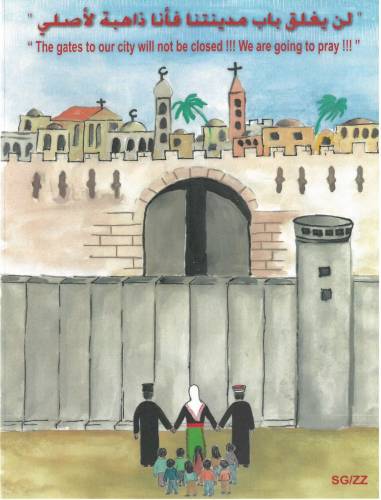My reflection to the Presbyterian Church
May 15, 2023

Zoughbi
Mahmoud Darkish once said, “Whenever they find the reality that doesn’t suit them, they alter it with a bulldozer.” It is the reality of the Palestinians facing the Nakba (catastrophe) of 1948. You know, the Nabka didn’t happen only in 1948; it has been happening since 1948, as the leveling of villages is still occurring. House demolitions are on the rise, confiscation of lands is still ongoing, children, young adults, and others continue to be imprisoned, ethnic cleansing still occurs and unemployment is skyrocketing. It was a shocking war of 1948, a war which led to “independence for Israel” but a Nakba for the Palestinian Arabs in which 750,000 at least were forced to leave their country, and where 600 villages were destroyed.
The whole story started with the Zionist idea that Jews are people without land and Palestine was a land without people — so why not have the people without a land settle in Palestine, a country without a people? In 1948, the dreams of Palestinians were shattered; their land was divided — 77.3% became Israel, and 22.7% became the West Bank, despite the populations reflecting the inverse. Jerusalem was under Jordan’s rules and Gaza Strip under Egyptian rule until 1967. In 1967, Israel occupied the remnant of Palestine, and all of the historical land came under Israel’s occupation. Palestinians were scattered into five groups. Those inside Israel have an Israeli Passport, those in the West Bank have Palestinian travel documents, those in Gaza have Egyptian travel documents, East Jerusalem Palestinians have Israeli laissez passes, and Palestinians in the diaspora have different Arab and foreign passports. The land is divided, and the people are scattered, but their dream is to be united despite their diversity in living situation. Half of Palestinians are refugees. They are scattered, too, and live in 60 refugee camps around the Middle East, including the motherland.

Zoughbi
“They divided my garments among them, and for my vesture they cast lots” John 19:24.
Let me draw some lessons from the catastrophe:
The Palestinians will not disappear. There is a big difference between wishful thinking and reality; Israel would like to control all the land, and there is a demographic war between Israel and Palestine. The number of Palestinians is almost equal to the Israeli population. No one will disappear.
Israel will continue with its expansionism and ethnic cleansing of Palestinians. In fact, Israel wants more geography and less Palestinian demography, but this will not work. (Another way of saying this is, “While Israel wants the land of the Palestinians, it refuses to accept the people who come with the land.”) Let us learn from the example of South Africa, Northern Ireland and the Civil Rights movement in the States. “No injustice will last forever.”
 Stories are stronger than their devious scheme: “I will tell you something about stories,” Leslie Marmon Silko once said. “They are not just entertainment. Do not be fooled. They are all we have, you see, all we have fight off illness and death. You do not have anything if you do not have stories. Their evil is mighty, but it cannot stand up to our stories. So, they try to destroy the stories. Let the stories be confused or forgotten. They would like that. They would be happy. Because we would be defenseless then.”
Stories are stronger than their devious scheme: “I will tell you something about stories,” Leslie Marmon Silko once said. “They are not just entertainment. Do not be fooled. They are all we have, you see, all we have fight off illness and death. You do not have anything if you do not have stories. Their evil is mighty, but it cannot stand up to our stories. So, they try to destroy the stories. Let the stories be confused or forgotten. They would like that. They would be happy. Because we would be defenseless then.”
Let us pray together for the steadfastness and the unity of our people, and for the integrity of the land, despite all the challenges, difficulties and hardships that we face. No doubt, we will celebrate life with the resurrected Savior. “We are troubled on every side, yet not distressed; we are perplexed, but not in despair; persecuted, but not forsaken; cast down, but not destroyed; always bearing about in the body the dying of the Lord Jesus that the life also of Jesus might be made manifest in our body.”
Indeed, it is not the epoch of demise of the nation, but it is the rebirth of people’s dreams and hopes.
Zoughbi for Douglas Dicks, Associate for Ecumenical Partnerships — St. Andrew’s Scots Memorial Church, Jerusalem, Facilitator for Education for Peace and Justice in Israel and Palestine — Presbyterian Church (U.S.A.)
Daily Readings
Today’s Focus: May 15 Palestinian Nakba Remembrance Day
Let us join in prayer for:
PC(USA) Agencies’ Staff
Devan Caton, Operations Business Analyst, Presbyterian Foundation
Stephanie Caudill, Mission Associate for Resources & Promotion, World Mission, Presbyterian Mission Agency